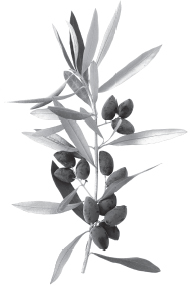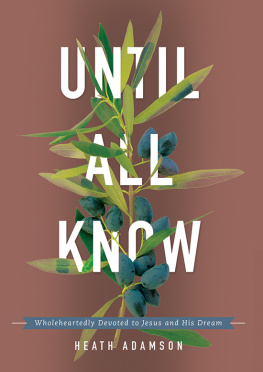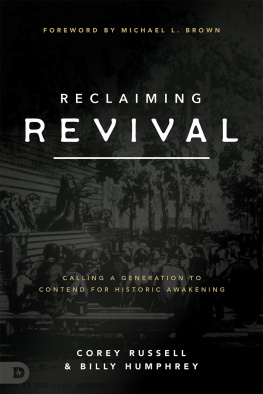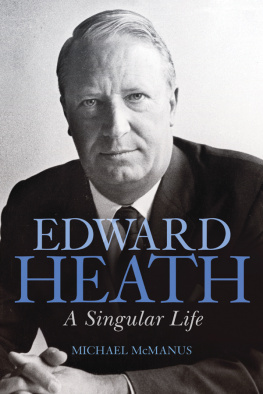UNTIL
ALL
KNOW
WHOLEHEARTEDLY DEVOTED TO
JESUS AND HIS DREAM
HEATH ADAMSON

Copyright 2017 by Heath Adamson
ALL RIGHTS RESERVED
Published by Gospel Publishing House
1445 N. Boonville Ave.
Springfield, Missouri 65802
www.myhealthychurch.com
No part of this book may be reproduced, stored in a retrieval system,
or transmitted in any form or by any meanselectronic, mechanical,
photocopy, recording, or, otherwisewithout prior written permission of the
publisher, except for brief quotations used in connection with reviews in
magazines or newspapers.
Cover and interior design and formatting by Prodigy Pixel
(www.prodigypixel.com)
Unless otherwise specified, all Scripture quotations are taken from the Holy
Bible, New International Version, NIV. Copyright 1973, 1978, 1984, 2011 by
Biblica, Inc. Used by permission of Zondervan. All rights reserved worldwide.
www.zondervan.com. The NIV and New International Version are trademarks
registered in the United States Patent and Trademark Office by Biblica, Inc.
Scripture quotations marked ESV are from THE ENGLISH STANDARD VERSION.
2001 by Crossway Bibles, a division of Good News Publishers. Used by
permission.
Scripture quotations marked NKJV are from the New King James Version of the
Bible. 1982 by Thomas Nelson, Inc. Used by permission. All rights reserved.
Scripture quotations marked NCV are from the New Century Version. 2005
by Thomas Nelson, Inc. Used by permission. All rights reserved.
Scripture quotations marked NLT are from the Holy Bible, New Living
Translation. 1996, 2004, 2007. Used by permission of Tyndale House
Publishers, Inc., Wheaton, Illinois 60189. All rights reserved.
ISBN: 978-1-60731-477-6
Printed in the United States of America
21 20 19 18 17 1 2 3 4 5

To Ali, Leighton, and Dallon.
For this season and those remaining, the fig tree is always in bloom.
I will teach you hidden lessons from our past
stories we have heard and known,
stories our ancestors handed down to us.
We will not hide these truths from our children;
we will tell the next generation
about the glorious deeds of the LORD,
about his power and his mighty wonders.
For he issued his laws to Jacob;
he gave his instructions to Israel.
He commanded our ancestors
to teach them to their children,
so the next generation might know them
even the children not yet born
and they in turn will teach their own children.
So each generation should set its hope anew on God,
not forgetting his glorious miracles
and obeying his commands.
PSALM 78:27, NLT
CONTENTS
Some places arent supposed to teem with life. Some places are just too dry.
The Sahel is more than four thousand miles wide and lies just below the Sahara Desert. During May, June, July, and August, twelve months worth of rain will fall and the remaining eight months will be arid and difficult, even deadly. Eight months without rain can have a profound effect on life. Cracks creep across the desert floor. Eyes burn from the dust kicked up thousands of feet in the air by the hot winds. Mirages become commonplace on the horizon. Humans and animals alike crave a drop of water, a bite of food. One wonders how long this area can sustain life.
Del Tarr, a missionary who served fourteen years in West Africa, observed this place firsthand. He knew the dry and dusty roads too well. He recalls how a four-month rainy season meant that farmers grew, harvested, and rationed a years worth of food in a few short months. Sorghum and milo are two of the major products grown in this remote area of Africa.
Del recalls how the months of October and November were filled with celebration, singing, and dancing. The season of harvest had arrived, and the granaries were filled with food. In the villages, each adult and child enjoyed a luxurious two meals a day. Using ancient stones to grind the grain into flour, the villagers lived off of food consistent with what Del describes as yesterdays cream of wheat. He goes on to say, The sticky mush is eaten hot; they roll it into little balls between their fingers, drop it into a bit of sauce and then pop it into their mouths. The meal lies heavy on their stomachs so they can sleep.
With December the villagers know that the luxury of two meals a day will soon come to an end. Grain begins to run low, and families skip breakfast to conserve food. January doesnt bring new hope because, as Tarr explains, Not one family in fifty is still eating two meals a day.
In February, the one evening meal enjoyed and relished by everyone grows smaller and smaller. In March, many of the children become sick as their immune systems are weakened from malnourishment and hunger. One half of a meal a day just isnt enough.
Here is how Del Tarr graphically described the plight of these people to me:
April is the month that haunts my memory. You hear the babies crying in the twilight. They pass most days with only an evening cup of gruel.
Then, inevitably, it happens. One day a six- or seven-year-old boy comes running to his father, bursting with excitement. Daddy! Daddy! Weve got grain! he shouts.
The father calms him down and replies, Son, you know we havent had grain for weeks.
Yes, we have! the boy insists. Out in the hut where we keep the goats I found a leather sack hanging up on the wall. When I put my hand insidethe sack I felt the grain. Theres grain in the sack! Give it to Mommy so she can make flour, and tonight our tummies can sleep!
The father stands motionless.
Son, we cant do that, he gently explains. The seeds in that sack are next years seed grain. Those seeds are the only thing between us and starvation. Were keeping the grain until the rains come again. Then well plant it.
The rains finally arrive in May, and when they do the young boy watches his father take the sack from the wall and do the most unreasonable thing imaginable. Instead of feeding his desperately weakened family, he walks to the field and with tears streaming down his face he takes the precious seed and scatters it in the soil. Why? Because he believes in the harvest.
The dad was willing to plant his most precious seed because he believed in the importance of the harvest. One of my favorite names used in Scripture for Jesus is a root out of dry ground (Isaiah 53:2, NKJV). Its interesting to me that when planting His Son in the world, God chose an environment and landscape similar to the Sahel: a place where life isnt supposed to grow and the cries of hungry children fill the night air. Thats where God planted the Savior. Jesus breathes life over the dead places. He causes things to grow when they arent supposed to. Why? Because to Him, things arent necessarily dead; theyre merely dormant. This is what Moses experienced in another desert.
A young Hebrew child, Moses was supposed to die. Pharaoh issued the edict for the murder of the innocents, and soldiers killed the children. It was Gods providence that Moses, discovered by Pharaohs daughter on the banks of the river, would grow up in the palace of the leader who had issued the order for his death. Moses became accustomed to the ways of royalty during a time when Egypt enslaved the Hebrews for over four hundred years. Ironically, Moses was the only Hebrew in the land who understood how royalty lived.












